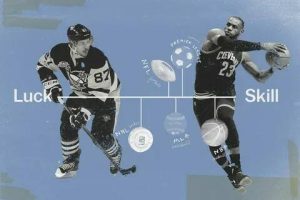In sports betting, both luck and skill play important roles, but their influence differs in different aspects of the activity. Here’s a breakdown of luck and skill in sports betting:
- Luck:
- Unexpected events: In sports, there are always unforeseen events that can impact the outcome of a game, such as injuries, weather conditions, referee decisions, or unexpected player performances. These factors are largely beyond the bettor’s control and rely on luck.
- Variance: Over a small sample size of bets, luck can have a significant impact. The outcome of individual bets may be influenced by random fluctuations, and luck can either result in favorable wins or unfavorable losses.
- Skill:
- Analysis and research: Skilled bettors invest time and effort in analyzing relevant information, statistics, team or player performance, injuries, and other factors that can influence the outcome of a game. By conducting thorough research and analysis, skilled bettors can identify value bets and make more informed decisions.
- Bankroll management: Skillful bettors understand the importance of proper bankroll management, which involves allocating funds wisely, assessing risk levels, and avoiding impulsive or emotionally driven bets. Effective bankroll management helps skilled bettors navigate losing streaks and optimize long-term profitability.
- Line shopping: Skilled bettors compare odds across different sportsbooks to find the best possible value. By identifying discrepancies in the odds, they can capitalize on favorable lines and improve their chances of profitability.
In the short term, luck can heavily influence the outcome of individual bets, especially when unexpected events occur. However, skill becomes more influential in the long run. Skilled bettors aim to identify and exploit discrepancies in odds, manage their risks, and make profitable bets based on their analysis and expertise.
It’s important to note that even the most skilled bettors cannot eliminate luck entirely. Sports betting involves inherent uncertainty, and unexpected outcomes will occur. However, skillful analysis and decision-making can give bettors an edge and increase their chances of long-term profitability.
In summary, luck and skill both play roles in sports betting. While luck influences short-term outcomes and unforeseen events, skillful analysis, research, and effective bankroll management can increase the probability of success in the long run. Skilled bettors strive to leverage their knowledge and expertise to make informed decisions and identify value bets.
Luck
Luck, by its nature, is unpredictable and uncontrollable. In sports betting, luck refers to unexpected and random events that can influence the outcome of a game or a bet. While you can’t directly control luck, you can take certain approaches to incorporate it into your sports betting strategy. Here are a few tips on how to use luck in sports betting:
- Embrace the randomness: Understand that luck is a natural part of sports betting. Sometimes luck will work in your favor, and other times it won’t. Accepting the randomness and being mentally prepared for both winning and losing outcomes can help you maintain a balanced and rational approach to betting.
- Manage your bankroll: One way to account for luck is by practicing proper bankroll management. Set aside a dedicated betting budget that you can afford to lose without significant financial impact. By managing your bankroll effectively, you ensure that any losses attributed to bad luck won’t have a detrimental effect on your overall financial situation.
- Focus on long-term profitability: Luck can have a significant impact on short-term results, but skill and analysis play a more influential role in the long run. Instead of focusing on individual bets or short-term outcomes, aim to achieve consistent profitability over time. This means making well-informed bets based on thorough research, analysis, and identifying value opportunities.
- Be selective with your bets: One way to minimize the impact of luck is by being selective with the bets you make. Rather than placing bets on every game or event, focus on areas where you have expertise and can make more informed predictions. By narrowing your focus, you can make better judgments and reduce the influence of luck to some extent.
- Adapt and learn from outcomes: Luck can swing both ways, and it’s important to learn from both winning and losing outcomes. When luck is in your favor, don’t assume it will always be that way. Similarly, when luck works against you, avoid becoming discouraged or making impulsive decisions. Analyze the outcomes objectively, identify areas for improvement, and adjust your strategy accordingly.
Remember that luck is ultimately beyond your control, and it’s impossible to predict or manipulate it. Sports betting involves a balance between luck and skill, and understanding this dynamic can help you approach your betting activities with a realistic mindset. By combining sound analysis, research, and effective bankroll management with a humble acceptance of luck’s influence, you can navigate the unpredictable nature of sports betting more effectively.

Skill
Using skill in sports betting involves applying analysis, research, and strategy to make more informed and calculated decisions. Here are some tips on how to use skill effectively in sports betting:
- Research and analysis: Take the time to gather relevant information http://boikhuco.co.za and analyze it thoroughly. This includes studying team or player statistics, performance trends, injuries, playing conditions, and any other factors that may impact the outcome of a game. The more you know, the better equipped you are to make informed betting decisions.
- Identify value bets: Look for discrepancies between the odds offered by sportsbooks and your assessment of the actual probabilities. A value bet is one where the odds offered are higher than what you believe the true probability should be. By identifying value bets, you can increase your chances of long-term profitability.
- Specialize in specific sports or leagues: Instead of spreading your knowledge across multiple sports, consider specializing in one or a few sports or leagues. By focusing your expertise, you can become more knowledgeable about the teams, players, and dynamics of those specific areas. This allows you to make more informed predictions and identify betting opportunities others may overlook.
- Bankroll management: Skillful bankroll management is crucial for long-term success in sports betting. Set a dedicated betting budget and avoid risking too much of your bankroll on a single bet. Proper bankroll management helps you withstand losing streaks and ensures that you have enough funds to capitalize on profitable opportunities.
- Develop a strategy: Consider developing a systematic approach or strategy for your betting activities. This may include setting criteria for placing bets, such as specific odds ranges, types of bets, or certain conditions that must be met. Having a well-defined strategy helps you avoid impulsive decisions and maintains a disciplined approach to betting.
- Learn from past outcomes: Analyze your past bets and outcomes to identify patterns, strengths, and weaknesses in your betting approach. Learn from your mistakes and successes, and adjust your strategy accordingly. Continuous learning and improvement are key to refining your skills as a sports bettor.
- Control emotions: Emotions can cloud judgment and lead to impulsive or irrational betting decisions. It’s important to remain calm, objective, and disciplined in your approach. Avoid chasing losses or becoming overconfident after a winning streak. Stick to your strategy and make decisions based on analysis and research rather than emotions.
Remember, while skill can increase your chances of success, it doesn’t guarantee winning outcomes in every bet. Sports betting still involves an element of uncertainty, and luck can play a role. By combining skillful analysis, research, and strategy with proper bankroll management and emotional control, you can improve your overall profitability and navigate the world of sports betting more effectively.
Do Skill and Luck Really Matter?
Both skill and luck have their roles in sports betting, but their relative importance can vary depending on the timeframe and the specific aspects of the betting activity. Let’s take a closer look at the significance of skill and luck in sports betting:
- Short-term perspective:
- Luck: In the short term, luck can have a significant impact on the outcome of individual bets. Unexpected events, random fluctuations, and unpredictable factors can lead to both favorable and unfavorable results. Luck can override skill in the short term, and even skilled bettors can experience losing streaks due to unfortunate circumstances or unexpected outcomes.
- Skill: While luck can dominate in the short term, skill still plays a role. Skilled bettors make more informed decisions based on analysis, research, and expertise. They aim to identify value bets and capitalize on favorable odds over time. Skillful bankroll management and disciplined strategies can help mitigate short-term fluctuations caused by luck.
- Long-term perspective:
- Luck: As the number of bets increases, the impact of luck tends to diminish. Random occurrences tend to even out over a larger sample size, and skilled bettors rely on this regression to the mean. In the long run, luck becomes less significant compared to skill.
- Skill: Skill is crucial for long-term success in sports betting. Skilled bettors leverage their knowledge, analysis, and strategies to identify value bets, manage their bankroll effectively, and maintain a disciplined approach. Over time, skillful analysis and decision-making can lead to consistent profitability, as the influence of luck tends to balance out.
It’s important to recognize that skill and luck are not mutually exclusive in sports betting. While skill increases the probability of success and long-term profitability, luck can still influence the outcome of individual bets. Skilled bettors aim to maximize their edge by making well-informed decisions, managing their risks, and adapting their strategies based on outcomes and new information.
In summary, both skill and luck matter in sports betting, but their significance may vary in the short term versus the long term. Skilled bettors rely on their expertise, analysis, and strategy to improve their chances of success over time, while understanding that luck can still play a role in individual outcomes. Balancing skill and luck is essential for navigating the uncertainties of sports betting effectively.
